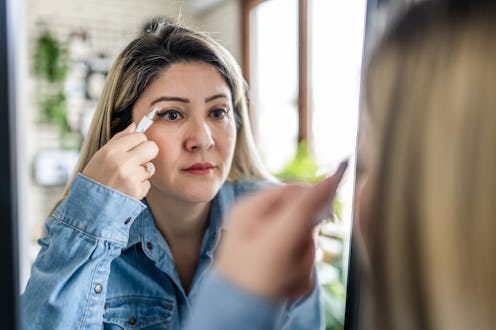Beauty
TikTokers With Eczema Are Opening Up About Topical Steroid Withdrawal
Here’s what to know.

Eczema is a tricky skin condition to manage. Almost anything can cause flare ups — stress, changes in routine, new seasons…the list goes on. I’ve had the condition since childhood, and the way it affects my skin has changed enormously over time. Flare-ups pop up in new spots on my body now, and the same remedies I used in my youth (mostly Vaseline and a cleanser-free routine) aren’t effective.
While scrolling through TikTok, I came across videos about topical steroid withdrawal. I had never heard of it before, and was quickly enlightened about its prevalence among those with skin conditions, and what a painful, difficult process it is. I was alarmed — topical steroids are a big part of my skin care routine, and I had no idea about topical steroid withdrawal.
In order to find out more, I reached out to a TikToker who has experienced it and dermatologists. Read on for what they had to say.
What Is Topical Steroid Withdrawal?
According to Dr. Ruth Jobarteh, M.D., dermatology advisor to DRMTLGY, topical steroid withdrawal can be broken down into two parts: the addiction phase and the withdrawal phase.
“Topical steroid addiction or withdrawal occurs due to inappropriate use, typically from the use of moderate to high potency steroids on the face and genitals over a long period of time in people with various skin conditions, especially eczema and seborrheic dermatitis,” she explains. “The ‘addiction’ phase occurs when the area of concern is completely symptom-free while using the topical steroid, and the “withdrawal” phase typically occurs within days or weeks of discontinuing the steroid, which leads to redness, burning, peeling, scaling, swelling, acne-like bumps, itching, and pain.”
New York City-based dermatologist Dr. Snehal Amin adds that “sometimes people report systemic symptoms including tiredness, hair loss.” According to Jobarteh, those symptoms can last for months.
Emilie Chho, a TikTok user who went viral after sharing her experience with topical steroid withdrawal, tells me that there’s so much misinformation out there. One of the most common errors is confusing withdrawal for an eczema flare-up.
“Topical steroid withdrawal is not the same as eczema,” she explains. “Too many doctors or people will say that this is just worsening eczema. Chho knows firsthand that the two are extremely different. “I've had eczema before it became like this, and it was never anything with the thermoregulation or full red skin syndrome condition. Eczema is small patches or patches of rash. This is totally different.”
There are several ways to treat topical steroid withdrawal, and most people experiencing it will need to employ a combination of them over time to help heal their skin.
Double board-certified dermatologist Dr. Brendan Camp advises that the “goal of therapy is to stop the inappropriate use of topical steroids so that the skin recovers from withdrawal symptoms.” He adds that treatments can include “gentle skin care, oral antibiotics that have anti-inflammatory properties, and topical medications that are not steroids but help address inflammation through different mechanisms of action. Symptoms may also be treated with cold compresses, gentle cleansers and moisturizers, or antihistamines.”
Chho has found that Rinvoq, a one-a-day pill for inflammation, has helped her skin rejuvenate.
“Hopefully, I do not experience withdrawal symptoms from this medication, but I know it is not a steroid and that I am doing better,” she tells me. She’s also noticing that her skin does not have the same elasticity or texture as it did when she had topical steroid withdrawal and is getting smoother.
Looking for other ways to treat eczema flare-ups this summer? “Take warm showers or baths for 10 minutes or less, and avoid hot showers and baths because hot water dries out the skin,” Jobarteh recommends. “And opt for gentle and fragrance-free products, like the Aveeno Ultra-Calming Foaming Cleanser and La Roche Posay Lipikar AP+ Gentle Foaming Moisturizing Wash.”
If you’re going to use topical steroids, Jobarteh stresses the importance of following your prescribing dermatologist’s instructions in order to make sure you’re using your cream or pill safely.
For those experiencing topical steroid withdrawal, Chho says: “You do not have to use steroids again; you have a choice. Try to find a supportive doctor to help you through this. Teach and educate family friends about this, so they are aware.”
It’s also important to give yourself time. With the right information and support, your skin and your mind will recover.